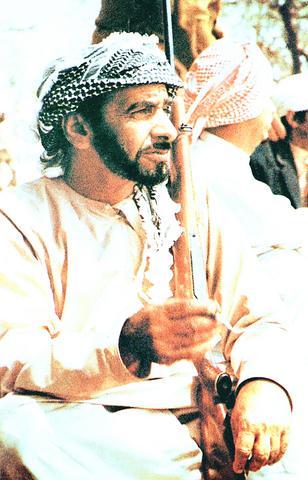The United Arab Emirates began 40 days of mourning yesterday following the death of the wealthy Gulf state's founding president, who helped transform seven backwater Gulf states into the world's ninth-largest oil producer and a high-tech commercial crossroads of gleaming skyscrapers.
Sheik Zayed bin Sultan Al Nahyan, one of the richest rulers in the world according to Forbes magazine, died Tuesday at the age of 86. He was credited with forging close ties with the US and the West during his rule of the country, which stretched back to its 1971 founding after winning independence from Britain.

PHOTO: AFP PHOTO
Sheik Zayed is expected to be succeeded by his eldest son, Sheik Khalifa bin Zayed Al Nahyan, as Emirates president. Sheik Khalifa, who has been crown prince of Abu Dhabi, the wealthiest of the seven emirates, since 1969, automatically becomes ruler of Abu Dhabi following his father's death.
The leaders of the seven emirates that make up the Emirates will appoint the new president within 30 days. In the meantime, the prime minister -- Sheik Maktoum bin Rashid Al Maktoum, a close relative of Sheik Zayed -- will serve as acting president. During the president's illness, Sheik Maktoum has been the public face of the Emirates.
Condolences have been flooding in from around the world following the death of Sheik Zayed, who had been ailing for several years and largely out of public eye. He had a kidney transplant in August 2000.
US Secretary of State Colin Powell said he was "saddened" by Sheik Zayed's death, describing the late leader as a "friend" and "symbol of benevolent and wise leadership characterized by generosity, tolerance, and avid pursuit of development and modernization."
Saudi Crown Prince Abdullah and Palestinian President Yasser Arafat were among numerous Arab leaders who expressed remorse for the loss of Sheik Zayed, whose rule led the unification of the seven tiny emirates on the eastern edge of the Arabian Peninsula -- once a backwater relegated to fishing from traditional dhow boats and diving for pearls in the Gulf waters.
"His death is a big loss for the Arab and Islamic nations and to humanity," Oman's Foreign Minister Youssef bin Alawi told Dubai-based Al-Arabiya TV.
Kuwait's information minister, Mohammed Abul-Hassan, credited Sheik Zayed with helping Kuwaitis who fled to the Emirates after Iraqi president Saddam Hussein ordered his forces to invade Kuwait in 1990, a move that led to the US-led 1991 Gulf War.
Alluding to the Emirates' incredible economic growth, Abul-Hassan said Sheik Zayed was an "example to be followed in his ability to turn the impossible into a truth."
The Emirates' top decision-making body, the Supreme Council, declared a 40-day official period of mourning would begin yesterday.

PRECARIOUS RELATIONS: Commentators in Saudi Arabia accuse the UAE of growing too bold, backing forces at odds with Saudi interests in various conflicts A Saudi Arabian media campaign targeting the United Arab Emirates (UAE) has deepened the Gulf’s worst row in years, stoking fears of a damaging fall-out in the financial heart of the Middle East. Fiery accusations of rights abuses and betrayal have circulated for weeks in state-run and social media after a brief conflict in Yemen, where Saudi airstrikes quelled an offensive by UAE-backed separatists. The United Arab Emirates is “investing in chaos and supporting secessionists” from Libya to Yemen and the Horn of Africa, Saudi Arabia’s al-Ekhbariya TV charged in a report this week. Such invective has been unheard of

US President Donald Trump on Saturday warned Canada that if it concludes a trade deal with China, he would impose a 100 percent tariff on all goods coming over the border. Relations between the US and its northern neighbor have been rocky since Trump returned to the White House a year ago, with spats over trade and Canadian Prime Minister Mark Carney decrying a “rupture” in the US-led global order. During a visit to Beijing earlier this month, Carney hailed a “new strategic partnership” with China that resulted in a “preliminary, but landmark trade agreement” to reduce tariffs — but

Chinese President Xi Jinping’s (習近平) purge of his most senior general is driven by his effort to both secure “total control” of his military and root out corruption, US Ambassador to China David Perdue said told Bloomberg Television yesterday. The probe into Zhang Youxia (張又俠), Xi’s second-in-command, announced over the weekend, is a “major development,” Perdue said, citing the family connections the vice chair of China’s apex military commission has with Xi. Chinese authorities said Zhang was being investigated for suspected serious discipline and law violations, without disclosing further details. “I take him at his word that there’s a corruption effort under

China executed 11 people linked to Myanmar criminal gangs, including “key members” of telecom scam operations, state media reported yesterday, as Beijing toughens its response to the sprawling, transnational industry. Fraud compounds where scammers lure Internet users into fake romantic relationships and cryptocurrency investments have flourished across Southeast Asia, including in Myanmar. Initially largely targeting Chinese speakers, the criminal groups behind the compounds have expanded operations into multiple languages to steal from victims around the world. Those conducting the scams are sometimes willing con artists, and other times trafficked foreign nationals forced to work. In the past few years, Beijing has stepped up cooperation